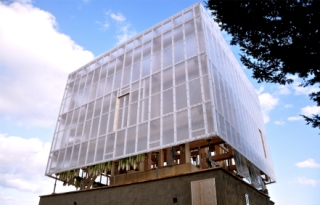Nov 25 2014
The LIXIL JS Foundation (located in Koto-ku, Tokyo; president: Yoichiro Ushioda), which facilitates surveys and research related to the housing and building materials industries as well as supporting the development of human resources, is pleased to announce today that “NEST WE GROW” designed by University of California, Berkeley of the United States has been completed on a site of Memu Meadows in Taiki-cho, Hokkaido, environmental technology research facilities managed by the foundation.
 University of California, Berkeley NEST WE GROW (Photo: Business Wire)
University of California, Berkeley NEST WE GROW (Photo: Business Wire)
NEST WE GROW is the top prize winner in the 4th LIXIL International University Architectural Competition sponsored by the LIXIL JS Foundation, aimed to seek and review next-generation sustainable housing technology and communicating that technology to global society. The project was designed based on the theme: “Productive Garden – A Space for Enjoying Hokkaido with All Five Senses.”
At NEST WE GROW the ground floor concrete wall is activated with deep and medium root vegetables like tomato, daikon, and pumpkin that grow in the soil blocks in the wall. Planters hung from the wood frame and placed on the elevated platform can grow shallow and medium root vegetables like cucumber, eggplant, and cabbage. The ground level holds a community kitchen where people can gather, prepare food, and dine.
The main structure of the Nest is comprised of nine composite columns made in Hokkaido. The Nest takes advantage of the transparent plastic corrugated sheets on the façade and roof, allowing light in for the plants, and heating the space during cooler months, which extends the growing season. Sliding panels in the façade and roof open to further facilitate air movement through the structure during the summer and warmer parts of the day. The funnel-shaped roof harvests rain water and snow melt. The collected water is delivered to tanks that are then used to irrigate the plants in the concrete wall.
With the completion of NEST WE GROW, Memu Meadows is currently a home to four houses designed by students, i.e., Machi Matou Ie designed by Waseda University completed in 2012 (the top prize winner in the 1st LIXIL International University Architectural Competition in 2011), BARN HOUSE designed by Keio University (the top prize winner in the 2nd competition) and HORIZON HOUSE designed by Harvard University completed last year (the top prize winner in the 3rd competition).
These houses will continue to be monitored after completion from a perspective of unique “next-generation sustainable housing” designed by the students themselves and the results will be verified. The LIXIL JS Foundation will extend support along with the local government (Taiki-cho, Hokkaido) continuously and communicate the results of demonstrations to society.
Source: http://www.lixiljsfound.or.jp/